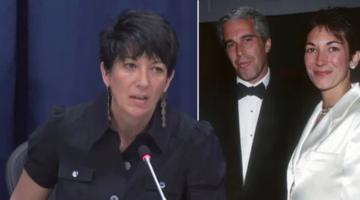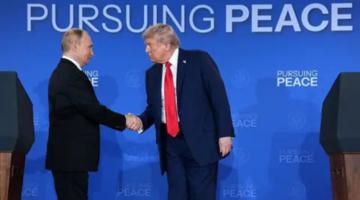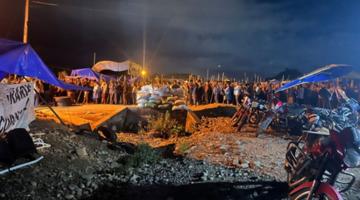American warfare has been waged almost exclusively against people of color, dating to independence and 1492.
“U.S. wars have made the country and the world less secure and more vulnerable to the real threats to our security.”
In this series, we ask acclaimed authors to answer five questions about their book. This week’s featured author is David Vine. Vine is Professor of Anthropology at American University. His book is The United States of War: A Global History of America's Endless Conflicts, from Columbus to the Islamic State.
Roberto Sirvent: How can your book help BAR readers understand the current political and social climate?
David Vine: Most BAR readers probably don’t need much help understanding the current climate, but I hope my book will contribute to both understanding and political action around the COVID-19 pandemic, the struggle for racial justice, and the militarization of U.S. life. With the pandemic, my book shows how the U.S. government’s disastrous COVID response is not simply the fault of the Trump administration. Responsibility for this disaster lies in no small part in the long history of U.S. wars. Decades of investment in war have come at the expense of investments in public health infrastructure and the broader health and welfare of the country’s people. The Post-9/11 Wars in Afghanistan, Iraq, Libya, Yemen, Somalia, and beyond have cost U.S. taxpayers at least $6.4 trillion. A tiny fraction of those trillions could have saved countless lives by funding adequate supplies of PPE, testing and vaccine-production capacity, ventilators, and other public health tools.
I hope The United States of War helps show how U.S. wars have not provided protection but instead have made the country and the world less secure and more vulnerable to the real threats to our security. So too, I hope the book underlines the urgency of ending what’s become a system of endless war.
As the BLM/M4BL protests have shown, the United States’ endless wars have been fought at home and abroad. The United States of War explains how extrajudicial police murders and other violence inflicted on Black and Latinx communities, Native Americans, other people of color, and the poor are intimately linked with the long history of American warfare waged almost exclusively against people of color, dating to independence and 1492. My book shows how the U.S. military, much like police forces, has largely served the interests of businesses and wealthy, mostly white, mostly male elites.
What do you hope activists and community organizers will take away from reading your book?
I hope The United States of War contributes to the growing momentum of social movements on the left, highlighted by BLM/M4BL. Specifically, I hope my book underlines the interconnected nature of the problems facing us—how war and militarism are intimately connected to capitalism; to climate disaster; to racial, gender, class, and other oppression; to the prison and immigration industrial complexes; among other destructive forces. Simultaneously, I hope the book helps encourage greater collaboration between movements that too often work on discrete issues isolated from one another. As others have said, we need to link Defunding the Police with Defunding the Pentagon.
The United States of War focuses on the underappreciated significance of the world’s largest-ever collection of extraterritorial military bases. I show how U.S. bases outside the United States have not only enabled the long history of U.S. wars but also made offensive wars of choice more likely. Closing overseas bases—today numbering around 800 in 80 countries and territories—must be an activist priority to reduce the prevalence of war, to avoid the damage U.S. bases inflict on local communities, and to save tens of billions of dollars annually.
Investment in bases abroad is a reminder of the wealth and human energy that U.S. leaders have ploughed into endless war. Investments in war have come at the expense of investments in health care, affordable housing, schools, and infrastructure, among others. President Eisenhower called this diversion of funds a “theft.” My book exposes this theft and the destruction directly wreaked by U.S. wars. I hope the book helps generate outrage and energy for struggles to cut the military budget and move hundreds of billions toward human needs. I hope my book provides encouragement and ideas to those struggling to end U.S. wars. I hope it inspires more to help repair the damage U.S. wars have inflicted on victims from all nations, including U.S. military personnel.
We know readers will learn a lot from your book, but what do you hope readers will un-learn? In other words, is there a particular ideology you’re hoping to dismantle?
I hope The United States of War helps readers—including those with an already critical view of U.S. history—to think differently about the history of the United States and its relationship with war and all things military. Most of us in the U.S. have been taught nationalist, white supremacist, colonialist versions of history, including celebratory histories of U.S. wars. These mythological histories have generally portrayed the United States as a peace-loving country that, when forced to fight, is always on the side of the good and the just.
The United States of War shows how the U.S. military has fought wars or been involved in some form of combat in all but 11 years since U.S. independence. Nearly all of these wars have been aggressive, offensive wars. They have included a century of wars against Native American peoples, 11 invasions of Canada, the conquest of nearly half of Mexico, the imperial war with Spain, decades of wars and invasions in Latin America, as well as Vietnam, Afghanistan, Iraq, and many others including little known conflicts in places such as Algiers, Peru, Samoa, Turkey, Angola, China, and Laos.
My book also challenges those who would deny that the United States is an empire. Many non-indigenous folks, myself included, have come to internalize, consciously or unconsciously, a “manifest destiny” version of U.S. history that naturalizes the conquest of Indian lands across North America and erases the ongoing colonization of Indigenous territory.
Ultimately, I hope The United States of War helps U.S. Americans and others reckon with the history of U.S. Empire, U.S. wars, and their catastrophic effects, which have left millions dead, wounded, and displaced. Without such a reckoning, the United States will likely continue to lurch from one war to the next, with war begetting war begetting war.
Who are the intellectual heroes that inspire your work?
There are too many intellectual heroes to name—and I worry about those I’ll overlook, given that my work owes a great debt to the work of so many others. Some who have been most influential include Indigenous scholars from Roxanne Dunbar-Ortiz to Julian Aguon and others in Guåhan/Guam. They along with local people struggling to shut down U.S. military bases overseas have transformed my understanding of the United States’ role in the world.
Scholars of U.S. Empire, U.S. wars, and U.S. militarization have also been inspirational. They include Catherine Lutz, Andrew Bacevich, Nikhil Pal Singh, Cynthia Enloe, Neta Crawford, Jeremy Scahill, Greg Grandin, and the late Marilyn Young, Neil Smith, and Chalmers Johnson. Most of these and my other intellectual heroes have been scholar-activists. Along with some of the best investigative journalists and narrative nonfiction writers, they have used rigorous research and beautiful writing to try to change the world for the better. Others examples include Leith Mullings, Paul Farmer, Frances Fox-Piven, Naomi Klein, Keeanga Yamahtta-Taylor, Rebecca Solnit, Gloria Anzaldúa, Anita Sarkeesian, Shirley Lindenbaum, Kim Hopper, Rob Rosenthal, Eric Schlosser, Alix Olson, and AOC.
Colleagues at American University and beyond provide intellectual and personal inspiration. Dr. King’s “Beyond Vietnam” speech and Eisenhower’s “Military Industrial Complex” farewell address inspire for different reasons. Both, sadly, are as relevant today as when they were spoken. Both should be required reading from junior high through graduate school. The shocking boldness and originality of Childish Gambino’s “This Is America” video inspired me to boldly avoid holding back my ideas while writing The United States of War. Despite the Childish reference—or perhaps because of it—I must admit that my list is overly white, overly male, overly U.S.-centric. I still have work to do to broaden and decolonize my own intellectual and inspirational canon.
In what way does your book help us imagine new worlds?
The United States of War tries to offer both a general vision and specific proposals for deconstructing the U.S. Empire and deimperializing the United States; for dismantling the Military Industrial Congressional Complex and the war system; and for developing new visions for U.S. foreign policy. This is obviously a rather ambitious set of goals, to say the least, and I certainly don’t claim to have any of the answers. I’m most interested in imagining new possibilities for the United States and the world in collaboration with others. For far too long, U.S. foreign policymaking has been dominated by a small group of overwhelmingly white, male, wealthy elites—that is, people who look like me. This has to change. Which means that I want to offer ideas for transforming the United States and its engagement with the world while insisting that we must democratize and dramatically expand the group of people shaping U.S. foreign policy.
The proposals I offer are also rooted in the visions of the decolonization movement, the civil rights movement, and other global social movements past and present that have demanded equality, justice, democracy, peace, and the extension of rights to those denied them for far too long. In the past few months, after I finished writing my book, growing calls for defunding the police and prison abolition have inspired me to demand wholesale, revolutionary transformation of the U.S. war system rather than short-sighted, supposedly “realistic” reforms.
Roberto Sirvent is Professor of Political and Social Ethics at Hope International University in Fullerton, CA, and an Affiliate Scholar at Yale University’s Interdisciplinary Center for Bioethics, where he directs the Race, Bioethics, and Public Health Project. He is co-author, with fellow BAR contributor Danny Haiphong, of the book, American Exceptionalism and American Innocence: A People’s History of Fake News—From the Revolutionary War to the War on Terror.
COMMENTS?
Please join the conversation on Black Agenda Report's Facebook page at http://facebook.com/blackagendareport
Or, you can comment by emailing us at comments@blackagendareport.com



















